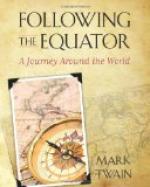There—it was plain enough that the reasons for wanting some changes made were abundant and reasonable, if this statement of the existing grievances was correct.
What the Uitlanders wanted was reform—under the existing Republic.
What they proposed to do was to secure these reforms by, prayer, petition, and persuasion.
They did petition. Also, they issued a Manifesto, whose very first note is a bugle-blast of loyalty: “We want the establishment of this Republic as a true Republic.”
Could anything be clearer than the Uitlander’s statement of the grievances and oppressions under which they were suffering? Could anything be more legal and citizen-like and law-respecting than their attitude as expressed by their Manifesto? No. Those things were perfectly clear, perfectly comprehensible.
But at this point the puzzles and riddles and confusions begin to flock in. You have arrived at a place which you cannot quite understand.
For you find that as a preparation for this loyal, lawful, and in every way unexceptionable attempt to persuade the government to right their grievances, the Uitlanders had smuggled a Maxim gun or two and 1,500 muskets into the town, concealed in oil tanks and coal cars, and had begun to form and drill military companies composed of clerks, merchants, and citizens generally.
What was their idea? Did they suppose that the Boers would attack them for petitioning, for redress? That could not be.
Did they suppose that the Boers would attack them even for issuing a Manifesto demanding relief under the existing government?
Yes, they apparently believed so, because the air was full of talk of forcing the government to grant redress if it were not granted peacefully.
The Reformers were men of high intelligence. If they were in earnest, they were taking extraordinary risks. They had enormously valuable properties to defend; their town was full of women and children; their mines and compounds were packed with thousands upon thousands of sturdy blacks. If the Boers attacked, the mines would close, the blacks would swarm out and get drunk; riot and conflagration and the Boers together might lose the Reformers more in a day, in money, blood, and suffering, than the desired political relief could compensate in ten years if they won the fight and secured the reforms.
It is May, 1897, now; a year has gone by, and the confusions of that day have been to a considerable degree cleared away. Mr. Cecil Rhodes, Dr. Jameson, and others responsible for the Raid, have testified before the Parliamentary Committee of Inquiry in London, and so have Mr. Lionel Phillips and other Johannesburg Reformers, monthly-nurses of the Revolution which was born dead. These testimonies have thrown light. Three books have added much to this light:




